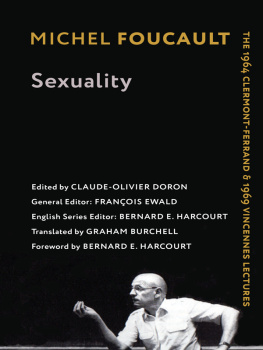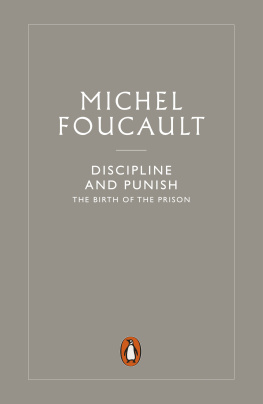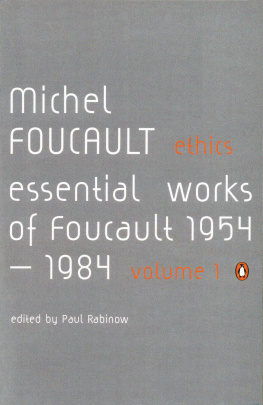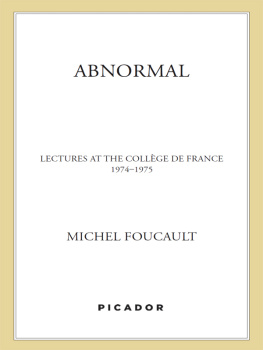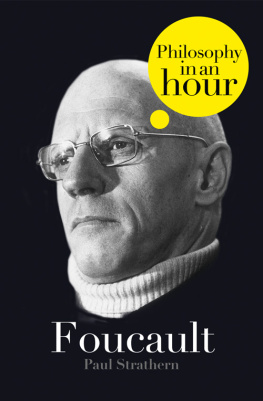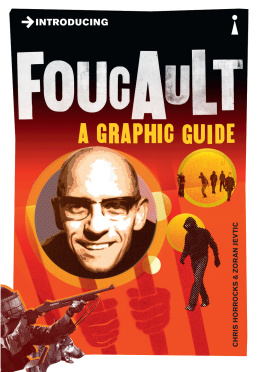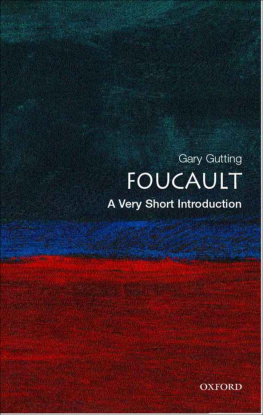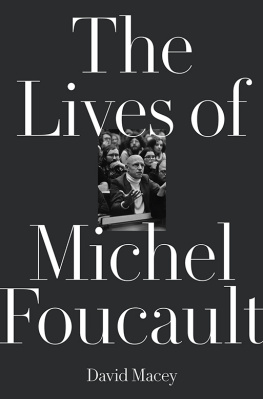Michel Foucault - Discipline & Punish: The Birth of the Prison
Here you can read online Michel Foucault - Discipline & Punish: The Birth of the Prison full text of the book (entire story) in english for free. Download pdf and epub, get meaning, cover and reviews about this ebook. year: 1995, publisher: Vintage Books, genre: Religion. Description of the work, (preface) as well as reviews are available. Best literature library LitArk.com created for fans of good reading and offers a wide selection of genres:
Romance novel
Science fiction
Adventure
Detective
Science
History
Home and family
Prose
Art
Politics
Computer
Non-fiction
Religion
Business
Children
Humor
Choose a favorite category and find really read worthwhile books. Enjoy immersion in the world of imagination, feel the emotions of the characters or learn something new for yourself, make an fascinating discovery.

- Book:Discipline & Punish: The Birth of the Prison
- Author:
- Publisher:Vintage Books
- Genre:
- Year:1995
- Rating:4 / 5
- Favourites:Add to favourites
- Your mark:
- 80
- 1
- 2
- 3
- 4
- 5
Discipline & Punish: The Birth of the Prison: summary, description and annotation
We offer to read an annotation, description, summary or preface (depends on what the author of the book "Discipline & Punish: The Birth of the Prison" wrote himself). If you haven't found the necessary information about the book — write in the comments, we will try to find it.
Discipline & Punish: The Birth of the Prison — read online for free the complete book (whole text) full work
Below is the text of the book, divided by pages. System saving the place of the last page read, allows you to conveniently read the book "Discipline & Punish: The Birth of the Prison" online for free, without having to search again every time where you left off. Put a bookmark, and you can go to the page where you finished reading at any time.
Font size:
Interval:
Bookmark:
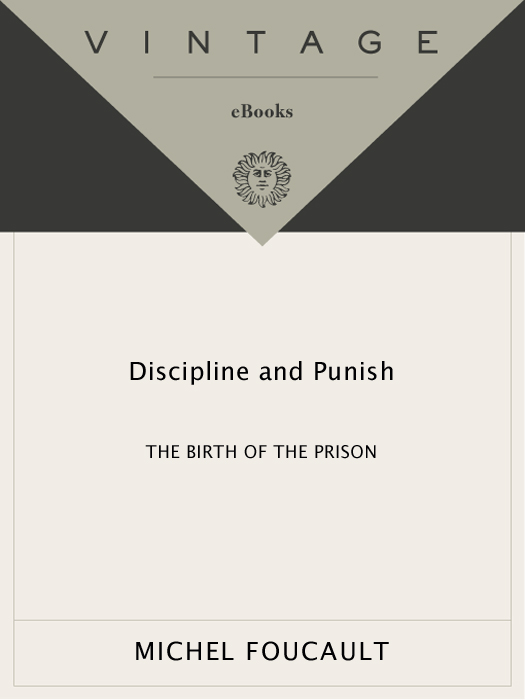
Michel Foucault
DISCIPLINE AND PUNISH
Michel Foucault was born in Poitiers, France, in 1926. He lectured in universities throughout the world; served as the director at the Institut Franais in Hamburg, Germany, and at the Institute de Philosophie at the Facult des Lettres in the University of Clermont-Ferrand, France; and wrote frequently for French newspapers and reviews. At the time of his death in 1984, he held a chair at Frances most prestigious institution, the Collge de France.

SECOND VINTAGE BOOKS EDITION, MAY 1995
Translation copyright1977 by Alan Sheridan
All rights reserved under International and Pan-American Copyright Conventions. Published in the United States by Random House, Inc., New York, and in Canada by Random House of Canada Limited, Toronto. Originally published in France as Surveiller et Punir: Naissance de la prison by Editions Gallimard, Paris. Copyright 1975 by Editions Gallimard. English translation originally published in Great Britain by Penguin Books, Ltd.
First American edition published by Pantheon Books in January 1978.
Library of Congress Cataloging-in-Publication Data
Foucault, Michel. Translation of Surveiller et punir. Bibliography : p.
1. Prisons. 2. Prison discipline.
3. Punishment. I. Title.
HV8666.F6813 1979 365 78-11257
eISBN: 978-0-307-81929-1
v3.1
Medal commemorating Louis XIVs first military revue in 1668.
Handwriting model.
Plan of the Panopticon by J. Bentham, 1843.
Plan for a penitentiary by N. Harou-Romain, 1840.
The Maison centrale at Rennes in 1877.
Interior of the penitentiary at Stateville, United States, twentieth century.
Bedtime at the reformatory of Mettray.
Lecture on the evils of alcoholism in the auditorium of Fresnes prison.
Steam machine for the celeriferous correction of young boys and girls.
Lorthopdie ou lart de prvenir et de corriger dans les enfants les difformits du corps (Orthopaedics or the art of preventing and correcting deformities of the body in children) by N. Andry, 1749.
Any closer translation of the French title of this book, Surveiller et punir, has proved unsatisfactory on various counts. To begin with, Foucault uses the infinitive, which, as here, may have the effect of an impersonal imperative. Such a nuance is denied us in English. More seriously the verb surveiller has no adequate English equivalent. Our noun surveillance has an altogether too restricted and technical use. Jeremy Bentham used the term inspect which Foucault translates as surveiller but the range of connotations does not correspond. Supervise is perhaps closest of all, but again the word has different associations. Observe is rather too neutral, though Foucault is aware of the aggression involved in any one-sided observation. In the end Foucault himself suggested Discipline and Punish, which relates closely to the books structure.
Another problem was posed by the French word supplice, which heads the first part of the book. For the sake of brevity I have entitled this first part Torture, but no single English word will cover the full range of the French. Here supplice refers specifically to the public torture and execution of criminals that provided one of the most popular spectacles of eighteenth-century France. By extension the word can also refer to any prolonged torture, mental as well as physical. Depending on the context, I have translated the word by torture, public execution or scaffold. The author also refers to another form of torture, la question, the extraction of confessions by interrogation and the systematic application of pain. Here I have followed the accepted translation, judicial torture.
References to other works are usually given not in footnotes but in an abbreviated form in the text itself. These references, in brackets, consist of the authors name and a page number; dates of publication are used to distinguish more than one work by an author, and roman numerals refer to volume numbers. Full references are to be found in the Bibliography.
Torture
On 2 March 1757 Damiens the regicide was condemned to make the amende honorable before the main door of the Church of Paris, where he was to be taken and conveyed in a cart, wearing nothing but a shirt, holding a torch of burning wax weighing two pounds; then, in the said cart, to the Place de Grve, where, on a scaffold that will be erected there, the flesh will be torn from his breasts, arms, thighs and calves with red-hot pincers, his right hand, holding the knife with which he committed the said parricide, burnt with sulphur, and, on those places where the flesh will be torn away, poured molten lead, boiling oil, burning resin, wax and sulphur melted together and then his body drawn and quartered by four horses and his limbs and body consumed by fire, reduced to ashes and his ashes thrown to the winds (Pices originales , 3724).
Finally, he was quartered, recounts the Gazette dAmsterdam of 1 April 1757. This last operation was very long, because the horses used were not accustomed to drawing; consequently, instead of four, six were needed; and when that did not suffice, they were forced, in order to cut off the wretchs thighs, to sever the sinews and hack at the joints
It is said that, though he was always a great swearer, no blasphemy escaped his lips; but the excessive pain made him utter horrible cries, and he often repeated: My God, have pity on me! Jesus, help me! The spectators were all edified by the solicitude of the parish priest of St Pauls who despite his great age did not spare himself in offering consolation to the patient.
Bouton, an officer of the watch, left us his account: The sulphur was lit, but the flame was so poor that only the top skin of the hand was burnt, and that only slightly. Then the executioner, his sleeves rolled up, took the steel pincers, which had been especially made for the occasion, and which were about a foot and a half long, and pulled first at the calf of the right leg, then at the thigh, and from there at the two fleshy parts of the right arm; then at the breasts. Though a strong, sturdy fellow, this executioner found it so difficult to tear away the pieces of flesh that he set about the same spot two or three times, twisting the pincers as he did so, and what he took away formed at each part a wound about the size of a six-pound crown piece.
After these tearings with the pincers, Damiens, who cried out profusely, though without swearing, raised his head and looked at himself; the same executioner dipped an iron spoon in the pot containing the boiling potion, which he poured liberally over each wound. Then the ropes that were to be harnessed to the horses were attached with cords to the patients body; the horses were then harnessed and placed alongside the arms and legs, one at each limb.
Monsieur Le Breton, the clerk of the court, went up to the patient several times and asked him if he had anything to say. He said he had not; at each torment, he cried out, as the damned in hell are supposed to cry out, Pardon, my God! Pardon, Lord. Despite all this pain, he raised his head from time to time and looked at himself boldly. The cords had been tied so tightly by the men who pulled the ends that they caused him indescribable pain. Monsieur le Breton went up to him again and asked him if he had anything to say; he said no. Several confessors went up to him and spoke to him at length; he willingly kissed the crucifix that was held out to him; he opened his lips and repeated: Pardon, Lord.
Font size:
Interval:
Bookmark:
Similar books «Discipline & Punish: The Birth of the Prison»
Look at similar books to Discipline & Punish: The Birth of the Prison. We have selected literature similar in name and meaning in the hope of providing readers with more options to find new, interesting, not yet read works.
Discussion, reviews of the book Discipline & Punish: The Birth of the Prison and just readers' own opinions. Leave your comments, write what you think about the work, its meaning or the main characters. Specify what exactly you liked and what you didn't like, and why you think so.

